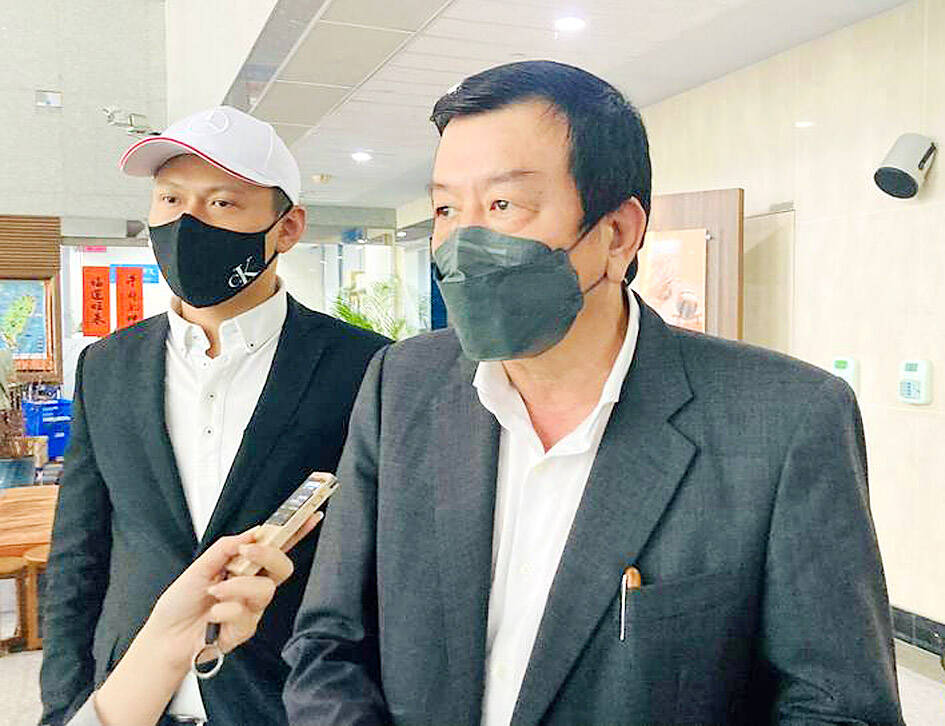A delegation of Taiwanese tour operators on Monday arrived in Beijing to meet Chinese officials with the goal of resuming cross-strait flights and tourism exchanges as soon as possible, as the COVID-19 pandemic abates.
The delegation, led by Travel Agents Association (TAA) chairman Hsiao Po-jen (蕭博仁), comprises travel association heads from the six special municipalities.
During the four-day trip, the delegation would meet with officials from China’s Taiwan Affairs Office (TAO), the Chinese Ministry of Culture and Travel and Association for Relations Across the Taiwan Straits, the TAA said.

Photo: Chen Hsin-yu, Taipei Times
Cross-strait exchanges have been suspended since 2020 due to the pandemic.
In 2019, 11.84 million foreigners visited Taiwan, 2.71 million of whom were from China, making them the largest source for international visitors, Tourism Bureau data showed.
Beijing has limited cross-strait flights to four Chinese airports — Beijing Capital Airport, Shanghai Pudong Airport, Chengdu Shuangliu Airport and Xiamen Gaoqi Airport. It has also banned Chinese tour groups from visiting Taiwan.
Prior to the pandemic, cross-strait flights were available from 10 Taiwanese and 61 Chinese airports.
The TAO last month said Chinese civil aviation officials had sent a letter to the Civil Aeronautics Administration, urging it to prioritize the resumption of cross-strait flights to 16 Chinese airports, including Guangzhou Baiyun Airport, as recommended by Taiwanese residing in China.
“We hope that Taiwan can remove all artificial restrictions and resume normal air traffic across the Taiwan Strait as soon as possible,” TAO spokeswoman Zhu Fenglian (朱鳳蓮) said on Wednesday last week.
The Tourism Bureau said it was not informed in advance about the delegation’s trip to China, adding that its position on welcoming Chinese tourists has not changed.
Minister of Transportation and Communications Wang Kwo-tsai (王國材) told a news conference on Thursday that a decision to resume flights to the 16 Chinese airports needs to be discussed further.
“However, the average passenger load factor of cross-strait flights to four Chinese airports is only about 50 percent,” Wang said.
“Meanwhile, Beijing does not allow Chinese to travel to Taiwan individually. Nor is Taiwan on the list of 20 countries and territories where group tours are permissible in China,” he added.
Taiwanese tour operators have also been banned from sending groups to China due to the pandemic.
“Restarting cross-strait flights to certain Chinese airports is related to the number of tourists traveling between Taiwan and China. The number of cross-strait flights would increase if more Chinese tourists are expected to come,” Wang told reporters.
Mainland Affairs Council Deputy Minister Lee Li-chen (李麗珍) said cross-strait tourism exchanges were suspended because of the pandemic.
“We are assessing the possibility of gradually resuming cross-strait exchanges,” Lee said. “We understand that the tourism sector is important in Taiwan and China, and people have a strong desire to travel overseas... The Ministry of Transportation and Communications is assessing the possibility of allowing travel agencies to form tour groups to China. People should wait patiently for the removal of the ban.”

The brilliant blue waters, thick foliage and bucolic atmosphere on this seemingly idyllic archipelago deep in the Pacific Ocean belie the key role it now plays in a titanic geopolitical struggle. Palau is again on the front line as China, and the US and its allies prepare their forces in an intensifying contest for control over the Asia-Pacific region. The democratic nation of just 17,000 people hosts US-controlled airstrips and soon-to-be-completed radar installations that the US military describes as “critical” to monitoring vast swathes of water and airspace. It is also a key piece of the second island chain, a string of

A magnitude 5.9 earthquake that struck about 33km off the coast of Hualien City was the "main shock" in a series of quakes in the area, with aftershocks expected over the next three days, the Central Weather Administration (CWA) said yesterday. Prior to the magnitude 5.9 quake shaking most of Taiwan at 6:53pm yesterday, six other earthquakes stronger than a magnitude of 4, starting with a magnitude 5.5 quake at 6:09pm, occurred in the area. CWA Seismological Center Director Wu Chien-fu (吳健富) confirmed that the quakes were all part of the same series and that the magnitude 5.5 temblor was

The Central Weather Administration has issued a heat alert for southeastern Taiwan, warning of temperatures as high as 36°C today, while alerting some coastal areas of strong winds later in the day. Kaohsiung’s Neimen District (內門) and Pingtung County’s Neipu Township (內埔) are under an orange heat alert, which warns of temperatures as high as 36°C for three consecutive days, the CWA said, citing southwest winds. The heat would also extend to Tainan’s Nansi (楠西) and Yujing (玉井) districts, as well as Pingtung’s Gaoshu (高樹), Yanpu (鹽埔) and Majia (瑪家) townships, it said, forecasting highs of up to 36°C in those areas

IN FULL SWING: Recall drives against lawmakers in Hualien, Taoyuan and Hsinchu have reached the second-stage threshold, the campaigners said Campaigners in a recall petition against Chinese Nationalist Party (KMT) Legislator Yen Kuan-heng (顏寬恒) in Taichung yesterday said their signature target is within sight, and that they need a big push to collect about 500 more signatures from locals to reach the second-stage threshold. Recall campaigns against KMT lawmakers Johnny Chiang (江啟臣), Yang Chiung-ying (楊瓊瓔) and Lo Ting-wei (羅廷瑋) are also close to the 10 percent threshold, and campaigners are mounting a final push this week. They need about 800 signatures against Chiang and about 2,000 against Yang. Campaigners seeking to recall Lo said they had reached the threshold figure over the